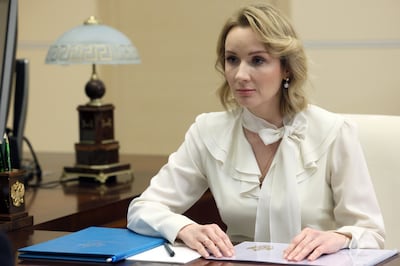Russian President Vladimir Putin was issued with an arrest warrant by the International Criminal Court on Friday.
The ICC said the warrant was issued over possible war crimes involving the alleged deportation of Ukrainian children.
But what does the warrant mean for Mr Putin and Russia's war in Ukraine?
What is Putin charged with?
The ICC said Mr Putin was responsible for the war crime of unlawful deportation of children and the unlawful transfer of children from occupied areas of Ukraine to Russia.
Moscow is accused of transferring 16,000 children from Ukraine to Russia unlawfully, according to Ukrainian government figures. Russia says that it has only evacuated people looking to leave voluntarily.
Moscow has repeatedly denied accusations of committing atrocities after invading Ukraine more than a year ago.
The warrant was issued on Friday, a day after a UN investigation found that Russia has committed war crimes in Ukraine including killings and torture that may amount to crimes against humanity.
The ICC also issued a warrant for Maria Alekseyevna Lvova-Belova, commissioner for Children’s Rights at the Russian President's office.
What is the ICC?
The ICC is an intergovernmental organisation based in The Hague in the Netherlands.
Its founding treaty, the Rome Statute, established it as a permanent court of last resort to prosecute political leaders and other perpetrators of atrocities, specifically war crimes, crimes against humanity and genocide.
The ICC has 123 members: 33 from Africa, 19 Asia-Pacific states, 18 from eastern Europe, 28 from Latin American and Caribbean countries and 25 from western Europe, including the UK.
Neither Russia nor the US are members.
The ICC can impose a maximum sentence of life imprisonment “when justified by the extreme gravity of the crime”, according to the treaty.
But the court has no police force of its own to enforce the warrants.
ICC President Piotr Hofmanski said it will be up to the international community to enforce the warrants.
Who is Maria Alekseyevna Lvova-Belova?
Ms Lvova-Belova was involved in the abduction of Ukrainian orphans in October, according to an AP investigation involving dozens of interviews and documents, the agency said.
She responded to the warrants with sarcasm.
"It is great that the international community has appreciated the work to help the children of our country, that we do not leave them in war zones, that we take them out, we create good conditions for them, that we surround them with loving, caring people,” she said.

What was Russia’s response to the warrants?
The Kremlin called the ICC’s actions "outrageous and unacceptable".
Russia, which does not recognise the ICC’s jurisdiction, called the warrants "null and void".
Russia does not recognise the court’s jurisdiction and has not signed up to the Rome Statutes.
That makes the chances of Mr Putin or Ms Lvova-Belova facing trial extremely remote.
Foreign Ministry spokeswoman Maria Zakharova dismissed a UN investigation and accusations of war crimes on Thursday. She said those behind the claims were not being objective.
What was Joe Biden’s response?
US President Joe Biden said on Friday the ICC’s decision to issue an arrest warrant for Mr Putin was justified. He said Mr Putin has clearly committed war crimes.
"He's clearly committed war crimes," Mr Biden said.
"I think it's justified. But the question is — it's not recognised internationally by us either. But I think it makes a very strong point."
What did Ukraine say?
Ukrainian President Volodymyr Zelenskyy said in his nightly address it was a “historic decision, from which historic responsibility will begin".
Sergiy Kyslytsya, Ukraine’s UN ambassador, said: “I said at the Security Council meeting [on the night of Russia’s invasion] that there is no purgatory for war criminals, they go straight to hell.
“Today, I would like to say that those of them who will remain alive after the military defeat of Russia will have to make a stop in The Hague on their way to hell.”
Who else has faced ICC warrants and were they arrested?
The ICC issued warrants for Joseph Kony, leader of the Ugandan Lord's Resistance Army rebel group in 2005 for crimes against humanity and war crimes. Mr Kony has never been arrested and remains on the run.
Congolese warlord Thomas Lubanga was jailed for 14 years for conscripting children into his rebel army in 2002-03. The ICC upheld the decision on appeal in 2014.
In 2009, Sudanese former president Omar Al Bashir became the first serving head of state to receive an ICC arrest warrant. Sudan said it would hand him over to the ICC in 2021, but never did.
Former Democratic Republic of Congo vice-president Jean-Pierre Bemba was jailed in 2008 after the ICC convicted him over crimes in the Central African Republic in 2002-03.

